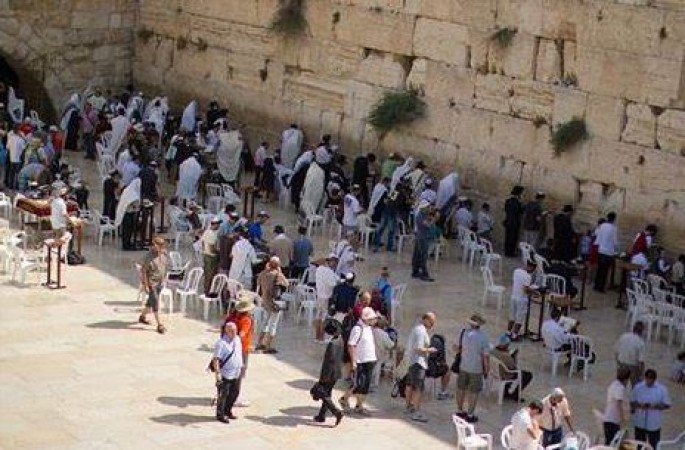
Jerusalem's Western Wall, also known as the Wailing Wall, is a place of immense historical and spiritual significance. For centuries, people from various religious backgrounds have flocked to this sacred site to offer their prayers and seek divine intervention. One of the unique customs associated with the Western Wall is the tradition of placing written prayers within the cracks of its ancient stones. This article explores the profound connection between this age-old tradition and the spiritual significance it holds for millions of believers worldwide.
The Historical Significance of Jerusalem's Western Wall
The Western Wall is the last remnant of the Second Temple of Jerusalem, which was destroyed by the Romans in 70 CE. It has since become a symbol of Jewish resilience, faith, and longing for the restoration of the Temple. The wall's grandeur and history draw millions of visitors, making it one of the most visited religious sites globally.
The Tradition of Placing Written Prayers in the Wall's Cracks
At the Western Wall, visitors have a unique opportunity to express their deepest thoughts, wishes, and prayers in a tangible way. Instead of simply reciting their prayers, believers write their heartfelt desires on small pieces of paper, known as "kvitlach," and place them within the ancient cracks of the wall. This custom is believed to date back centuries, and it is an integral part of the spiritual experience for many pilgrims.
Understanding the Spiritual Connection
The Wailing Wall as a Holy Site
The Western Wall is believed to be the closest accessible site to the Holy of Holies, the inner sanctuary of the ancient Temple. This proximity enhances the spiritual significance of the wall, as people feel a profound connection to the Divine when standing in its presence.
Why People Choose Written Prayers
Writing down prayers allows individuals to articulate their deepest emotions, hopes, and fears. It is a personal and intimate process that enables people to communicate with the Divine in a way that transcends spoken words.
The Process of Placing Prayers in the Wall
Prayers from Diverse Backgrounds
While the Western Wall is undeniably significant to Judaism, it attracts people of various religious and cultural backgrounds. Visitors of all faiths partake in the tradition of placing written prayers in the wall, creating an atmosphere of unity and shared spirituality.
Respect and Rituals
The act of placing prayers in the wall is accompanied by respect and solemnity. Visitors approach the wall with reverence, understanding the historical and spiritual weight of their actions. Many follow specific rituals or customs as they engage in this sacred practice.
The Symbolism Behind the Wall's Cracks
The cracks in the Western Wall are more than just physical imperfections; they hold symbolic meaning for those who place their prayers within them. These crevices are seen as conduits between the earthly realm and the Divine, representing the bridge between human hopes and the infinite wisdom of the Almighty.
Preserving and Collecting the Prayers
The custodians of the Western Wall, dedicated to preserving this age-old tradition, periodically collect the written prayers. The collected prayers are treated with utmost respect, and, in some cases, they are buried on the nearby Mount of Olives as a way of honoring their spiritual significance.
Experiencing the Emotional Impact
Placing a written prayer in the Western Wall is an emotional experience for many visitors. The process of writing, touching the ancient stones, and connecting with the collective prayers of millions creates an overwhelming sense of spiritual fulfillment.
Jerusalem: A City of Unity and Diversity
Jerusalem itself is a city of great religious diversity, with Christianity, Islam, and Judaism being the prominent faiths. The Western Wall, located in the heart of the Old City, becomes a symbol of harmony and understanding as people from all walks of life come together to share their devotion.
The Impact of Technology on the Tradition
In modern times, technology has also influenced the tradition of placing written prayers in the Western Wall. Today, virtual platforms allow people to submit their prayers online, expanding the reach of this age-old custom to a global audience.
Controversies Surrounding the Custom
While the tradition is cherished by many, it has also faced controversies and debates. Some critics argue that the massive volume of written prayers poses challenges to the preservation of the wall's historical structure. Finding a balance between tradition and preservation remains a topic of discussion.
Addressing Ethical Concerns
Another aspect of contention is the ethical use of these prayers. Some fear that the collected prayers may be exploited for commercial purposes or violate individuals' privacy. Ensuring the respectful treatment and use of these prayers is a matter that requires ongoing vigilance.
The Spiritual Influence of Jerusalem's Western Wall
The Western Wall continues to serve as a source of inspiration and spiritual influence for millions of people around the world. Its significance transcends religious boundaries, making it a symbol of hope, faith, and unity among humanity.
Jerusalem's Western Wall stands as a testament to the enduring power of faith and the deep yearning for a connection to the Divine. The tradition of placing written prayers in its cracks provides individuals with a unique and profound spiritual experience. As visitors come together to express their deepest hopes and wishes, the wall becomes a symbol of unity, bridging the gap between diverse beliefs. In a world where divisions can often overshadow commonalities, the Western Wall reminds us of the shared human desire for peace, understanding, and the power of collective prayer.
Diversity in India: Celebrating Unity in Variety
These are the five famous caves of Lord Shiva, that you should visit in Sawan
The Exploration of Morality in "Crime and Punishment" by Fyodor Dostoevsky